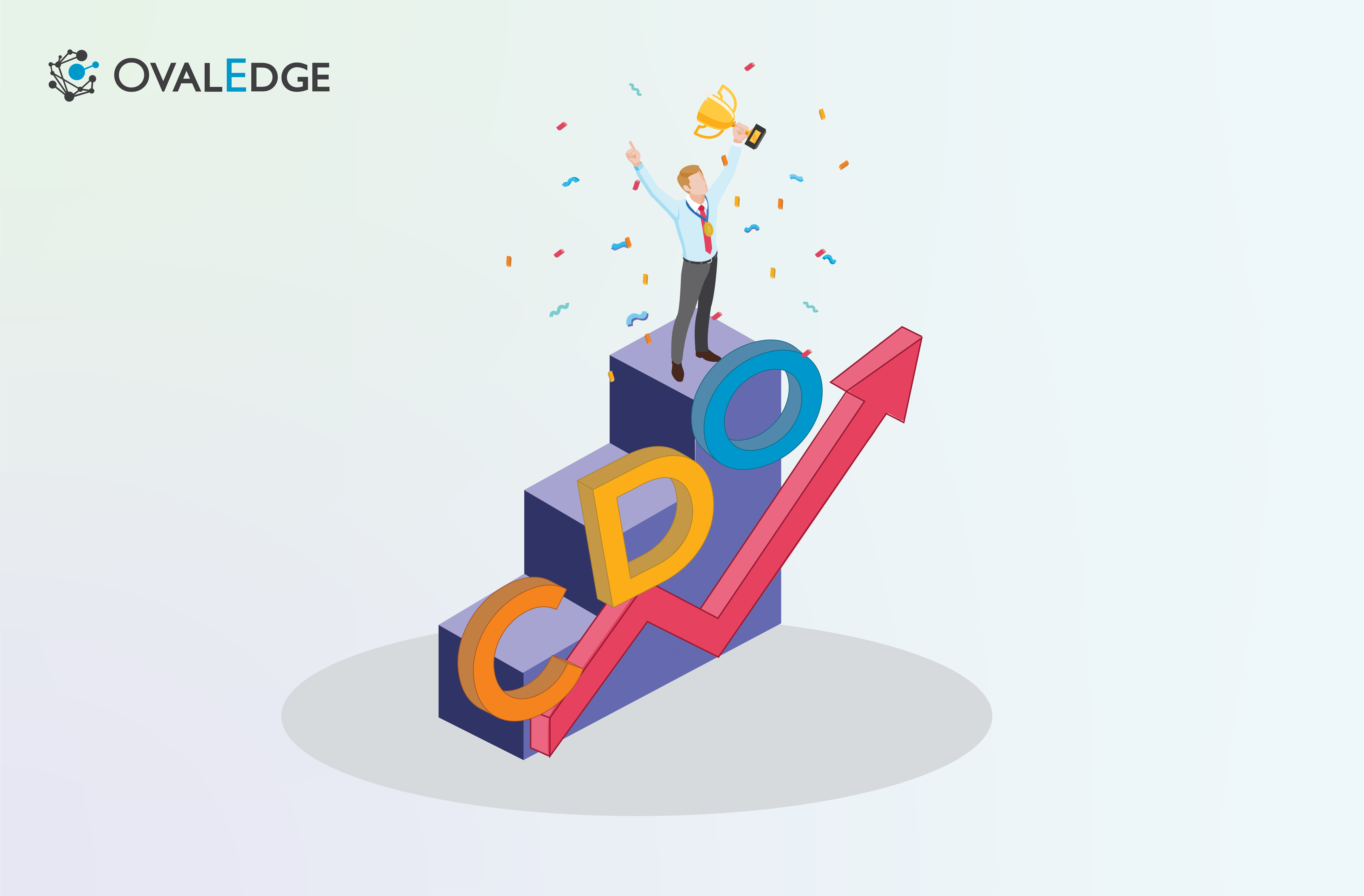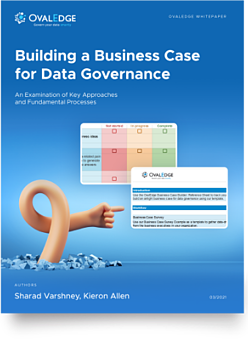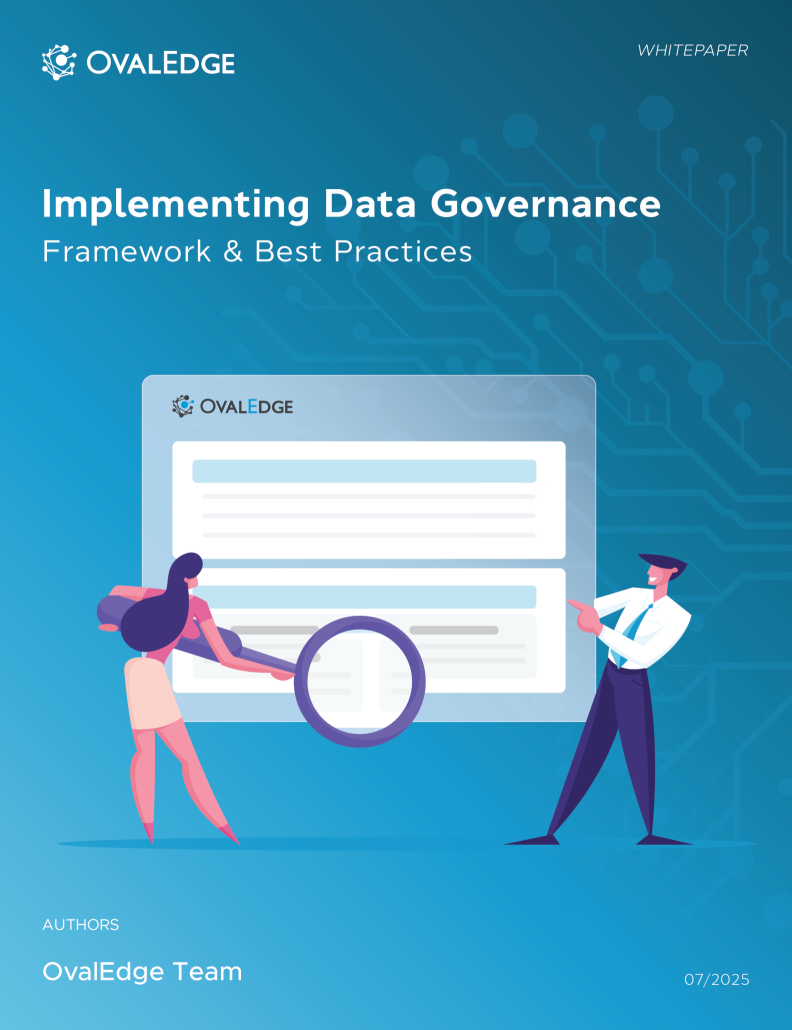Table of Contents

What is a Chief Data Officer? And How To Became One
The role of the Chief Data Officer (CDO) is inextricably linked with data governance. Without experience managing data governance programs, candidates simply don't have the experience to oversee a company-wide data strategy.
In the same way a Chief Marketing Officer needs more than communications experience or a CEO must have touched every point in modern business during their career, to become a Chief Data Officer, you can't simply have mastery of a single skill set. You must have mastered multiple aspects of data management and analytics, held leadership roles, and more to excel in the role.
Data governance plays a crucial part in quickly building data-focused skill sets because it incorporates many different elements. The quickest path to landing top Chief Data Officer jobs is by running a data governance program.
In this blog, we'll explain what is a Chief Data Officer, what they do, the qualifications and experience you need to become one, and how data governance experience is the best way to expedite your journey to the C-suite.
Related Post: Learn how data governance touches every corner of a progressive data strategy
What is a Chief Data Officer (CDO)?
As the volume and complexity of data sources increased, organizations across industries healthcare, finance, and beyond recognized the need for a dedicated executive to manage and leverage data assets. That’s where the Chief Data Officer job description comes in.
A 2015 study found that only 6% of organizations had a CDO. Fast forward to 2022, and 74% of surveyed companies had a CDO, a Chief Analytics Officer, or both integrated into a single role.
Ultimately, a CDO ensures the company uses data technologies in the best way possible to achieve business goals. Like any C-suite executive, they focus on organization-wide objectives through strategic data initiatives.
While a CMO achieves goals through marketing and a CFO through finance, a CDO drives growth through data. To become one is to reach the pinnacle of your industry. Naturally, the Chief Data Officer salary reflects this level of responsibility often exceeding $300,000 annually in the U.S and Chief Data Officer jobs remain among the most competitive executive roles in the market.
What does a CDO do?
A Chief Data Officer job description involves overseeing all enterprise data within an organization. They are accountable for ensuring responsible, accurate data collection, management, and storage.
They work closely with the CEO and other executives to align data-driven innovation with the company’s vision and cultivate a strong data-driven culture. CDOs operationalize data for collaborative projects, ensuring standardization and effective governance.
Beyond internal management, external communication plays a major role. A CDO must confidently liaise with regulators, partners, and other stakeholders to achieve compliance and business outcomes. They also manage budgets for data technologies and ensure data quality, literacy, and access policies are upheld.
Above all, a CDO leads their organization toward data-driven decision-making—often spearheading digital transformation initiatives.
How to become a CDO?
There are various steps required to achieving the top data job in the C-suite. However, you can group the requirements for completing these steps into three areas: qualifications, experience, and key skills.
Qualifications
You must have a formal education to achieve the best Chief Data Officer roles. While an undergraduate degree in data science or business is good, an MBA or data-focused master's degree is favourable as it will make you stand out from many other competitors.
Beyond this, a good CDO will have other data-specific qualifications too, awarded by well-known industry leaders, such as Microsoft, SAS, or IBM. Furthermore, a CDO may be proficient in other related skills like programming, SQL, Predictive Analysis, Machine Learning (ML), and Artificial Intelligence (AI).
Experience
The role of the CDO requires a wide and varied skill set. However, specialisms aren't always a benefit. Even if you have a wealth of knowledge in data analytics and have worked with AI and other emerging technologies, you will still be considered a subject matter expert and unlikely to achieve the position of CDO.
Data governance is different. The leadership skills and holistic knowledge of data technologies and strategies that come with running a data governance program are critical to the role of the CDO. Ultimately, it provides a fast route to becoming a CDO.
When you take on the position of Data Governance Lead, you have the opportunity to deal with multiple groups, address various department-specific concerns, and oversee a team to deal with data issues. Much in the same way you would as a CDO.
The traditional route requires you to undertake various roles in the data industry, be that analyst, engineer, architect, or any other data role, before you can consider applying for the job of CDO. Even then, you will likely lack the managerial and leadership skills that are imperative for the position.
Related Video: Career Paths in Data Governance
Key Skills
The key skills required for a CDO position include the following:
1. Leadership skills
2. Analytical mindset
3. Effective communications skills
3. Profound knowledge on security and compliance
Leadership: As we discussed in the previous section, running a data governance program provides you with a great deal of leadership and management experience. Leadership skills are a key quality for any C-suite position and the CDO is no exception.
You will be responsible for holding your team accountable for their actions and to ensure a successful data strategy in your organization, you must be prepared to lead by example. This includes skills in project management as you will oversee individual data projects department by department.
Analytics: While your role as CDO doesn’t always require you to undertake analysis tasks in your organization, you will be responsible for ensuring the data analysts under you perform to a high level. To that end, you must have experience in data analytics to steer their actions, understand the analytical tools required to achieve optimum results, and ultimately decide how data will be stored, accessed, and analyzed in your organization.
Communication: The ability to communicate effectively with your team is paramount to the success of a CDO. Yet, communication skills go beyond the requirements to steer the employees directly beneath you. You will need to be confident in talking with different department heads to help develop a data-driven culture and present your strategies to the rest of the board.
Security and compliance: An extensive knowledge in deploying data security and compliance provisions is an important skill for prospective CDOs. In your role, you must have the skills to find and implement the best security tools, understand the regulatory frameworks that you operate in and have the skills to implement compliance procedures, and be prepared to monitor how security and compliance are addressed and upheld.
Related Whitepaper: How to Ensure Data Privacy Compliance
How to maximize your value as a CDO?
It’s not enough just to carry out the tasks required of a CDO. To really excel in your role, you need to add value to your company through your leadership and actions. In the modern business landscape, the best ways to add value include the following:
- Take control of AI and analytics in your organization by finding and instructing the implementation of AI technologies that will dramatically boost your company’s capacity for analytics.
- Rotate your focus away from algorithms and towards data products. By doing so, you’ll be able to turn conceptual ideas and formulas into working applications that deliver real results through an end-to-end pipeline.
- Build strong relationships with other members of the C-suite so they can support a company-wide data-driven culture. This is particularly important with the finance department, as they will be able to translate your efforts into financial gains, better demonstrating ROA.
- Focus on clear, tangible goals. You must assess the level of data maturity on your organization and use this assessment to roll out manageable aims on a project-by-project basis.
Related Post: How Chief Data Officers overcome three key challenges they face
OvalEdge is a comprehensive, end-to-end data catalog and governance suite. With this tool, you can quickly and efficiently introduce data governance into the organization you represent. Use OvalEdge to establish a solid data governance program in your company and help expedite your rise to the top of the data industry food chain.
Frequently Asked Questions (FAQs)
- What is the salary of a Chief Data Officer?
The Chief Data Officer salary varies depending on company size, industry, and location. In the United States, the average CDO earns between $200,000 to $350,000 annually, with total Chief Data Officer compensation often including performance bonuses, equity, and other executive benefits. - What is the role of the Chief Data Officer?
The Chief Data Officer (CDO) oversees an organization’s data strategy, ensuring effective data governance, management, and utilization. They align data initiatives with business goals, promote data-driven decision-making, and lead teams to maintain data quality, compliance, and security across the enterprise. - How to become a CDO officer?
To become a Chief Data Officer, professionals typically need a mix of formal education (such as an MBA or master’s in data science), certifications in analytics or governance, and extensive experience leading data programs. Running a data governance initiative is one of the fastest ways to build the leadership and strategic experience required for Chief Data Officer jobs. - . What is the difference between a CIO and a CDO?
A Chief Information Officer (CIO) primarily focuses on managing IT infrastructure, systems, and technology operations, while a Chief Data Officer (CDO) is responsible for managing and leveraging data as a strategic asset. In short, the CIO handles technology; the CDO turns data into business value.
Book a call with us to find out:
|
OvalEdge recognized as a leader in data governance solutions
.png?width=1081&height=173&name=Forrester%201%20(1).png)
“Reference customers have repeatedly mentioned the great customer service they receive along with the support for their custom requirements, facilitating time to value. OvalEdge fits well with organizations prioritizing business user empowerment within their data governance strategy.”
.png?width=1081&height=241&name=KC%20-%20Logo%201%20(1).png)
“Reference customers have repeatedly mentioned the great customer service they receive along with the support for their custom requirements, facilitating time to value. OvalEdge fits well with organizations prioritizing business user empowerment within their data governance strategy.”
Gartner, Magic Quadrant for Data and Analytics Governance Platforms, January 2025
Gartner does not endorse any vendor, product or service depicted in its research publications, and does not advise technology users to select only those vendors with the highest ratings or other designation. Gartner research publications consist of the opinions of Gartner’s research organization and should not be construed as statements of fact. Gartner disclaims all warranties, expressed or implied, with respect to this research, including any warranties of merchantability or fitness for a particular purpose.
GARTNER and MAGIC QUADRANT are registered trademarks of Gartner, Inc. and/or its affiliates in the U.S. and internationally and are used herein with permission. All rights reserved.


.webp)


